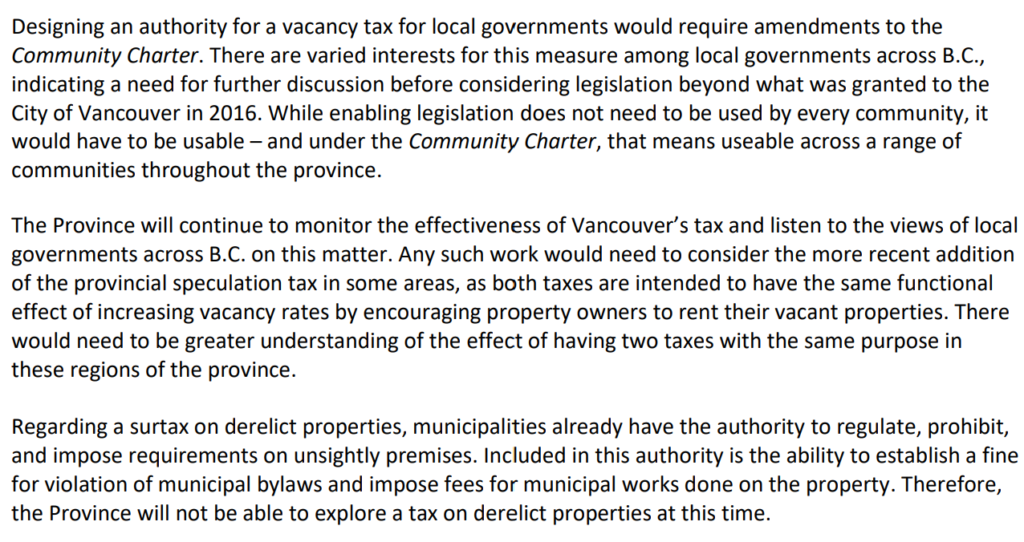Boy, its been a while since I did one of these, and there are a few in the queue. Sorry, folks, I really mean to be more timely with these, but to paraphrase Pascal, I don’t have enough time to write shorter notes. No Council meeting this week, so maybe I’ll try to knock a couple off. This was a fun one:
T J asks—
Has anyone proposed some kind of empty lot tax to encourage developers or property holders to activate the properties into some kind of use? Prime example corner of 5th Ave & 12th St but many others throughout downtown we noticed over a weekend walk.
Yes, people have proposed it, but it currently isn’t legal.
Municipalities in BC are pretty limited in how they can apply property taxes. For the most part, we are permitted to create tax rates for each of the 8 property classes assessed by the BC Assessment Authority (Residential, Industrial, Commercial, Farm, etc.), and all properties that fall within a class are assessed the same rate. That means Condos, rental apartments, townhouses and houses pay the same mill rate because they all fall under Residential Class, and big box multinational retailers pay the same mill rate as your favourite mom & pop haberdashery. Local Governments aren’t permitted to pick and choose preferential tax rates within those categories to, say, favour Mom & Pop over the Waltons, or favour Rentals over Condos, or favour improved lands over vacant lands.
Since the tax you pay is based on the assessed value, owners actually pay less tax on vacant land than on “improved” land, because the assessed value of the land is a combination of the value of the land and the value of the buildings upon it. Playing around in the BC assessment website, you can see sometimes the building is worth as much as the land, in some cases the building value is close enough to zero that tax essentially only relates to bare land value. Therefore, investing in land improvement on vacant or derelict properties increases the assessed value, and increases property taxes. In a sense, the current property tax system incentivizes keeping an investment property unimproved.
Best I can tell, the Provincial Speculation and Vacancy Tax does not apply to vacant or derelict properties – but don’t take that as legal advice (this is a blog post, not official communications from a tax professional), though the BC gov’t website is a little vague on this specific point. Maybe you will have more luck than me getting clarity from the legalese.
Interestingly, the City of Vancouver’s Empty Homes Tax does apply to vacant properties that are designated for residential use. Vancouver was given that ability through an amendment to the Vancouver Charter, so it is not applicable to municipalities regulated by the Community Charter like New West, and the province doesn’t seem interested in expanding it to other cities (see below). Regardless, as this tax is designed to incent owners to bring vacant residential property in to use, it would also not work to encourage the activation of the commercial properties like you mention in Downtown New West.
But your question was whether anyone has proposed this? The way Local Government leaders would propose this is to send a resolution to the UBCM meeting asking the Provincial government to change the legislation to make it possible. If the majority of Local Gov’t elected types at the UBCM convention vote to endorse this resolution, it becomes an endorsed resolution – an “official ask” of government. My quick review of just some recent UBCM resolution sessions turns up resolutions in 2016 (“B3- Vacant Land Taxation”), 2017 (”B91 Tax on Vacant & Derelict Residential Properties”), 2018 (“A3 Modify Speculation Tax: Local Government Vacancy Levy”), and 2019 ( “B19 Extension of Vacancy Taxation Authority to Local Governments”) all asking for some form of taxation power for vacant land, all endorsed by the membership of the UBCM.
Every year, the Provincial government responds to these resolutions, usually with some form of “we’ll think about it”. This excerpt is from their response to the 2019 resolution:
So, yeah, don’t hold your breath.
That said, as the Provincial Government notes, Local Governments do have some ability to fine derelict or unsightly property owners, though it is a somewhat onerous and staff-time-consuming process to demonstrate nuisance, and the Bylaw does not extend to our ability to say one must build a building on a lot. You are entitled to own an empty grass field or an empty gravel parking lot, as long as it doesn’t constitute a nuisance. Any attempt to use this Bylaw authority as a de facto tax would surely not survive a court challenge.
New Westminster does have one special power, though, and it is found in a unique piece of Provincial Legislation called the New Westminster Redevelopment Act, 1989. I would call your attention to Section 3 of the Act, as it is a bit of a Mjolnir-like piece of legislation. But that is probably best saved for a follow-up blog post as we talk about the current situation in Downtown New Westminster.
There was a Speculation and Vacancy Tax exemption for vacant land when the tax was first brought in, but it was a temporary exemption that has since been phased out. I imagine it was only in place to allow vacant land owners time to adjust and commence development given there wasn’t substantial notice originally.
https://www.dmcl.ca/changes-to-the-bc-speculation-and-vacancy-tax/